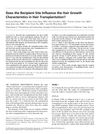 5 citations,
November 2016 in “Experimental and Therapeutic Medicine”
5 citations,
November 2016 in “Experimental and Therapeutic Medicine” BeauTop improves hair growth in androgenetic alopecia patients.
 4 citations,
August 2020 in “Journal of The American Academy of Dermatology”
4 citations,
August 2020 in “Journal of The American Academy of Dermatology” Hair loss link to COVID-19 severity likely due to other factors.
 4 citations,
January 2002 in “Annals of Dermatology”
4 citations,
January 2002 in “Annals of Dermatology” Androgenetic alopecia, or hair loss, is most common in people in their 30s, can start early, is often inherited, and may be influenced by factors like hormones and scalp health.
 2 citations,
March 2021 in “Cosmetics”
2 citations,
March 2021 in “Cosmetics” Hair transplant surgery is the most effective, safe, and satisfying treatment for hair loss.
 1 citations,
January 2010
1 citations,
January 2010 Asian women experiencing hair loss often feel embarrassed and unhappy, but hair transplantation can offer natural-looking results and improve their self-confidence.

Mesenchymal stem cell-derived exosomes significantly increase hair density and thickness in androgenic alopecia patients.
 April 2024 in “Journal of dermatology research reviews & reports”
April 2024 in “Journal of dermatology research reviews & reports” Using a laser helmet with Minoxidil works better for male hair loss than Minoxidil alone, with no extra side effects.
 August 2023 in “Journal of Periodontal Research”
August 2023 in “Journal of Periodontal Research” Hair loss in men aged 25-44 may be linked to gum disease.
 March 2018 in “Nepal journal of dermatology, venereology & leprology”
March 2018 in “Nepal journal of dermatology, venereology & leprology” Hair loss linked to prostate enlargement; stress and family history important factors.
 August 2015 in “Dermatologica Sinica”
August 2015 in “Dermatologica Sinica” Men with severe hair loss may have poorer sperm quality.
 204 citations,
May 2014 in “The Journal of Sexual Medicine”
204 citations,
May 2014 in “The Journal of Sexual Medicine” Hormone therapy for trans individuals is effective and generally safe in the short term.
 176 citations,
May 2020 in “Dermatologic Therapy”
176 citations,
May 2020 in “Dermatologic Therapy” COVID-19 can cause different skin symptoms that may help with early diagnosis and show how severe the disease is.
 155 citations,
December 2003 in “British Journal of Dermatology”
155 citations,
December 2003 in “British Journal of Dermatology” Hair loss increases with age; alcohol raises risk, more female partners lowers it.
 76 citations,
April 2005 in “Cancer Epidemiology, Biomarkers & Prevention”
76 citations,
April 2005 in “Cancer Epidemiology, Biomarkers & Prevention” E211 G>A gene linked to lower risk of severe prostate cancer and hair loss.
 53 citations,
January 2017 in “Skin appendage disorders”
53 citations,
January 2017 in “Skin appendage disorders” Botulinum toxin shows promise for various skin conditions but requires more research for confirmation and standardized use.
 41 citations,
March 2012 in “Clinical and Experimental Dermatology”
41 citations,
March 2012 in “Clinical and Experimental Dermatology” G allele of AR Stul polymorphism linked to higher hair loss risk, especially in white people.
 36 citations,
January 1998 in “Journal of Dermatological Treatment”
36 citations,
January 1998 in “Journal of Dermatological Treatment” The questionnaire effectively measures men's perceived hair growth and can distinguish between different treatments and dosages.
 31 citations,
January 2019 in “Journal of Cutaneous Medicine and Surgery”
31 citations,
January 2019 in “Journal of Cutaneous Medicine and Surgery” Platelet-Rich Plasma (PRP) therapy can promote hair growth and improve facial aesthetics, including reducing acne scars and facial burns, and it works best with three initial monthly injections.
 27 citations,
November 2020 in “International Journal of Dermatology”
27 citations,
November 2020 in “International Journal of Dermatology” COVID-19 can cause skin issues like chilblains and rashes, which may help in early detection, especially in patients without other symptoms.
 26 citations,
January 2007 in “Organogenesis”
26 citations,
January 2007 in “Organogenesis” Bioengineering can potentially treat hair loss by regenerating hair follicles and cloning hair, but the process is complex and needs more research.
 24 citations,
September 2002 in “Dermatologic Surgery”
24 citations,
September 2002 in “Dermatologic Surgery” The place where hair is transplanted can affect its growth and survival rates.
 19 citations,
June 2002 in “American Journal of Dermatopathology”
19 citations,
June 2002 in “American Journal of Dermatopathology” Apoptosis contributes to hair loss in androgenetic alopecia.
 10 citations,
January 2009 in “Elsevier eBooks”
10 citations,
January 2009 in “Elsevier eBooks” Hair growth is influenced by hormones and goes through different phases; androgens can both promote and inhibit hair growth depending on the body area.
 7 citations,
June 1992 in “The Journal of Dermatologic Surgery and Oncology”
7 citations,
June 1992 in “The Journal of Dermatologic Surgery and Oncology” Hair transplantation is a viable treatment for some types of female hair loss, with careful donor assessment and attention to psychological factors.
 5 citations,
June 2021 in “Pharmacological Reports”
5 citations,
June 2021 in “Pharmacological Reports” Vitamin D may help reduce antibody levels in men with autoimmune thyroiditis and early-onset androgenic alopecia, but has no significant impact on thyroid function.
 4 citations,
May 2021 in “Journal of The European Academy of Dermatology and Venereology”
4 citations,
May 2021 in “Journal of The European Academy of Dermatology and Venereology” Hair loss doesn't affect COVID-19 severity.
 4 citations,
August 2017 in “Journal of Cosmetic Dermatology”
4 citations,
August 2017 in “Journal of Cosmetic Dermatology” Finger length ratio may indicate male hair loss.
 4 citations,
January 2015 in “Journal of clinical & experimental dermatology research”
4 citations,
January 2015 in “Journal of clinical & experimental dermatology research” PRP injections may slightly improve hair density and count for male hair loss, but more research is needed.
 1 citations,
January 2022 in “Transgender health”
1 citations,
January 2022 in “Transgender health” Hormone therapy in transgender individuals can increase acne and affect hair growth and loss.
 1 citations,
September 2021 in “Skin appendage disorders”
1 citations,
September 2021 in “Skin appendage disorders” Botulinum toxin injections can help treat common hair loss in men, but more research is needed to confirm this and understand how it works.






























